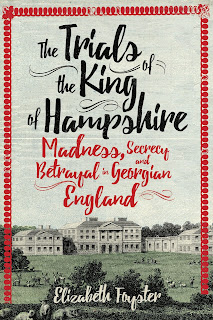 Elizabeth Foyster, The Trials of the King of Hampshire (Oneworld)
Elizabeth Foyster, The Trials of the King of Hampshire (Oneworld)I was glad to find the blurb on this book use the word 'hilarious'. I was concerned that one ought not to find the pain, suffering and skullduggery of this story the least bit amusing if applying all our politically correct conscience to it.
Words like 'lunatic' and 'idiot' are wielded as playground insults quite thoughtlessly, with not much fine differentiation between one who has become deranged and one who never developed from a child-like condition. It shouldn't even be an excuse that it makes it funny if the subject is an aristocrat but John Charles, 3rd Earl of Portsmouth, was not quite right from the start. If he hadn't been heir to the title and estates, it might not have mattered so much, but he was. And so, with the family having to protect the iinheritance against all-comers, it has to go to court to establish whether or not he is a lunatic and thus not responsible enough for any but his rightful family to benefit from his legacy.
Born in 1767, he is looked after from an early age by a rector and his wife who are subsequently to become the parents of Jane Austen, and later in life, in a sort of sublime to ridiculous literary gamut, he is to have associations with Byron, but difficulties with his speech are an early sign that he is not quite right. He is ridiculed at school for his obvious difference but, with a fortune that comes along with his birthright as the eldest child of his family, much worse is to come.
Jeaan Seilaz inveigles himself as a trusted servant until in a position to kidnap the 22 year old in the middle of the night with the intention of getting him to sign over all his estates to miscreants who very nearly succeed in getting him out of the country and from then on, it is a Rabelasian tale of marriages, protectors, plot and counterplot as some try to divert the inheritance their way while his younger brothers have to disrupt all such chicanery.
Portsmouth has little or no idea about where children come from and after his first wife, the older, devoted Grace Norton is worn out by her efforts to maintain appearances, the younger Mary Ann Norton is placed by her family as his second wife, who has her lover come to her bed in the night while the 3rd Earl is there on the other side. The earl's main sexual focus appears to be on blood-letting which he persuades the women on his estates to indulge him in for a generous reward.
There is not much he enjoys more than ceremony and occasions, especially if the bells are to be rung and he takes part enthusiastically in any funeral he can find his way to without any of the requisite display of grief or decorum.
One is less taken aback by his self-interest as a landowner and his political involvement which is little different from what politics has been about from long before his time until the present but,
Portsmouth's letters epitomize the very worst of the English absentee landowner. They are staggering in their insensitivity and selfishness.
and that extends into his routine demands that servants and staff are flogged for the slightest perceived misdemeanour.
Witnesses are brought to the eventual trials to provide evidence of his sanity, which he could be encouraged to simulate in public, or otherwise but if his first trial in 1822 gives him his liberty then that in 1823 declares him a lunatic, which is necessary to establish in order to revoke claims on the estate from those outside of the family.
It can't help to provide a litany of strange and amazing stories which the newspapers naaturally report to a very interested public but it is disturbing, too, for the horrors inflicted on others as well as the sufferings of Portsmouth himself but it is all somehow distanced by two hundred years and perhaps the wealth or devious scheming of its main characters which make it like a cartoon, not least because, Grace apart, it is difficult to sympathize with anybody in it. But it is good news that Portsmouth, with all the drama behind him, and having declared himself King of Hampshire, lives to the age of 86 and enjoys thirty years of solitude on his estates, and that the 4th earl falls ill at the time of his succession and dies in short order so that all his efforts to maintain the family line only serve to benefit the 5th earl, who is cvalled Isaac Newton, as if the saga needed quite such an unecceaarily lame ending.
Lurid, surreal and Machiavellian, it is a sensational but now little-known piece of history that Elizabeth Foyster has re-constructed and provided a lively account of it. I think by now we have gone beyond the time when we need to learn something and finish by saying 'the moral of the story is...' but as the questions of lunacy, idiocy and odd behaviour were addressed and considered, it was likely that one had to compare and contrast those with notions of what is normal.
That appears to be something that we most accurately identify by its absence.





